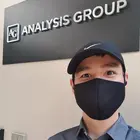
Internship Spotlight: Luigi Cortez ’22, Analysis Group
Luigi Cortez ’22 on spending the summer applying data and analysis to case work at an economic consulting firm.
What did you do this past summer? We asked second-year MBA students to check in from their summer internships, where they applied the lessons of their first year at Yale SOM.
Luigi Cortez ’22
Internship: Analysis Group, Boston MA
Hometown: Manila, Philippines
Pronouns: he/him/his
Clubs and Affiliations: Consulting Club, Southeast Asia Club
Favorite SOM Class: Customer and Competitor
Favorite SOM Professor: Heidi Brooks
Favorite New Haven eatery: Haven Hot Chicken
Bonus facts: I am a recent fitness enthusiast and have lost 35 pounds since last year! This was definitely made challenging by all the great pizza in New Haven.
This summer, I joined Analysis Group (AG) as a summer associate in their Boston office. A good portion of the firm’s work involves providing support for expert witnesses in litigation, but AG also helps companies and government agencies worldwide ground their decisions in data and rigorous analysis. A case I worked on involved a generic drug manufacturer alleging that a branded competitor foreclosed its entry into the market. My team helped an expert witness argue why the challenged conduct was anticompetitive and in violation of antitrust laws, articulate how it caused harm to consumers, and estimate the damages caused not only to our client but to patients as well. It was a great way to learn about the U.S. legal system and the important role economic analysis plays in the courts.
In addition to case work, AG also provided opportunities for interns to learn more about its work outside of healthcare and litigation. Through practice area overviews, I learned about AG’s work in areas such as estimating the economic burden of depression, assessing the impacts of various renewable energy policies, and measuring the costs associated with air pollution. It was fascinating to see how economics could help answer difficult yet highly relevant questions such as these.
Yale SOM prepared me to succeed in my internship in several ways. First, Yale’s rich heritage in economics (with several Nobel laureates in the field!) shines through in the core curriculum. Economic analysis is present in a wide array of classes, such as Customer, State & Society, Negotiation, and even Workforce. Familiarity and proficiency with the field across different contexts was definitely advantageous in my work.
Second, Managing Groups and Teams, Global Virtual Teams, and Power and Politics helped me work well with my case teams. Furthermore, I saw how these skills would be more important as one goes up through the ranks. One interesting thing about AG is that it operates via an internal labor market model–case teams are formed and disbanded with their underlying projects. Since there are no fixed reporting lines, consultants can choose the projects they want to be on and the colleagues they want to work with. Conversely, principals and VPs have the liberty of staffing their projects through their own internal networks. Consequently, one needs to be adept at establishing good rapport, building networks, and cultivating long-term relationships.
Third, AG’s supportive and highly collaborative culture reminded me of Yale SOM, where people are very open to connect with and help each other out. At AG, I was able reach out to senior staff to learn about their work and ask for advice, and they were gracious enough to spare me their time.
I had a wonderful time with AG and I am excited to pursue a career in economic consulting. The coming years hold important questions for society to grapple with. How do we address climate change? How do we deal with large technology companies? What kinds of business conduct are we willing to deem acceptable? Economic analysis will undoubtedly play an important role in how we think about them.



